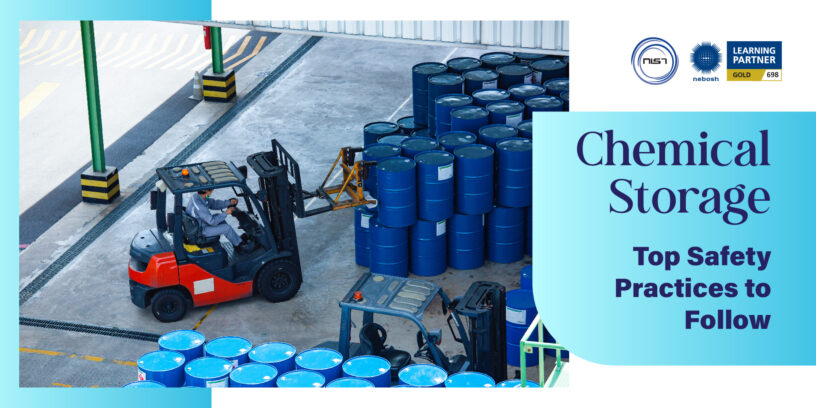Generally, most industries use a variety of chemicals in order to complete their manufacturing process. Chemicals are utilized not only in the production department but also in the quality control departments, which are also referred to as the laboratories where production-related samples are evaluated, in process development and research and development labs.
As diverse chemicals may be brought to the storage facility and each chemical has a unique set of chemical and physical properties, proper handling and storage are essential. To prevent any mishaps when handling and storing chemicals, safety precautions must be taken and precise procedures must be followed. This helps to keep your workplace safe & efficient while also making sure they are protected from harm.
When storing chemicals at work, there are a few things to keep in mind. Initially, you must confirm that they are kept in a secure location. This indicates that they ought to be kept out of unauthorized access or accidental spillage that can lead to disastrous consequences. Always make sure chemicals are clearly labelled. This will make it easier for you and others to use the supplies correctly.
- Storage areas must be clearly specified.
- Different chemicals should be stored in separate sections (for ease of identification).
- Certain materials & substances should be stored separately; alternatively, purpose-built safe storage (such as gas-bottle cages) may be necessary.
- Areas should be maintained clean and neat, and they should be examined on a regular basis.
- Where necessary (for example, where flammable products are housed), appropriate warning signs should be shown.
- Work activities should not take place in storage spaces.
What to Consider When It Comes To Storing Chemicals?
Maintaining a safe and orderly work environment requires proper chemical storage in the workplace. Here are some general guidelines to keep in mind when storing them:
#1 Compatibility: Be sure to store goods properly to avoid compatibility problems and possible chemical interactions between various compounds. Hazardous items should be stored separately and in accordance with safety rules.
#2 Proper labelling: All chemicals should be appropriately labelled so that their contents are known. The name of the substance, any associated dangers, and handling guidelines should all be included on labels. Employees can more easily recognize and handle chemicals correctly this way.
#3 Segregate: To avoid cross-contamination or the blending of incompatible chemicals, they should be stored safely. To prevent potentially hazardous chemical reactions, separate incompatible materials. To determine compatibility and segregation, use safety data sheets (SDS) or other relevant sources of information.
#4 Ventilation: Consider the ventilation needs of particular chemicals, especially if they emit fumes or gases or have particular temperature demands. Make sure the storage space has enough ventilation to avoid the accumulation of potentially dangerous substances or the development of an unfavorable environment.
#5 Fire safety: When storing chemicals, use fire safety precautions. Maintain clear pathways for emergency egress and adhere to all applicable standards and guidelines for fire protection, such as keeping combustible materials far from sources of ignition.
#6 Training & information: Make sure that staff members have received training on the proper handling of chemicals and are aware of any potential hazards. Consult pertinent safety data sheets (SDS) or other essential papers to inform staff on the characteristics and handling requirements of stored chemicals.
#7 Audit & reviews: Review your chemical storage methods on a regular basis to see whether they are in accordance with regulations, spot any areas that could use improvement, and implement any necessary updates. To guarantee correct chemical handling, labelling, and storage, ensure to conduct periodical audits.
It’s crucial to remember that the precise criteria for chemical storage can change based on the sector, the location, and the kinds of chemicals being stored. To ensure worker compliance and safety, always refer to the pertinent safety laws, codes, and standards that are applicable to your industry and working conditions.
Chemical Safety Training @ NIST Global
Learn more about safe chemical storage & handling in our bespoke Chemical safety training. Our industry-specific Chemical safety training programmes at NIST Global will provide your employees a thorough understanding of the best safety procedures for handling and storing chemicals. Our industrial professionals with extensive hands-on expertise in Chemical safety have helped top businesses operate more effectively.
For further details, kindly call our corporate team @ 91 8754465588 or mail us at info@nistglobal.com














Leave a Reply